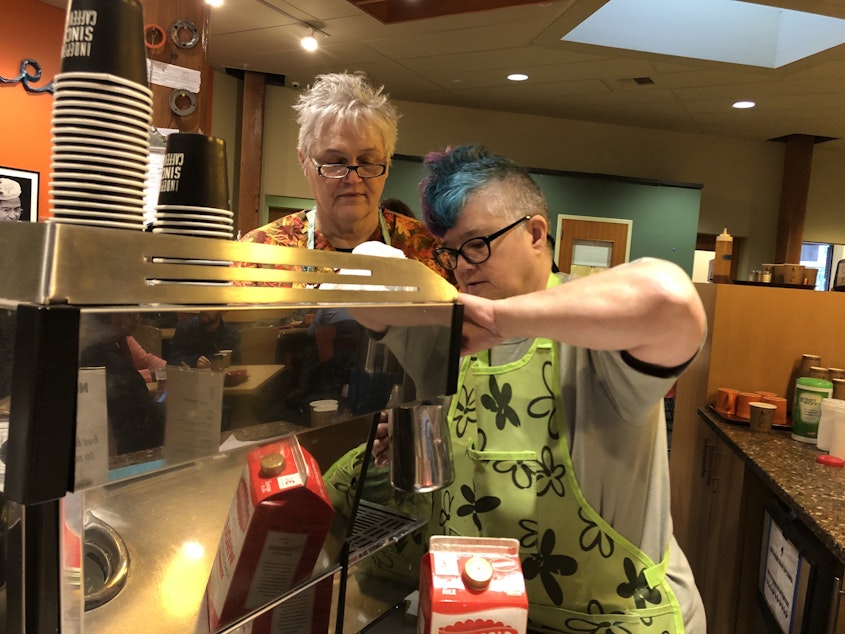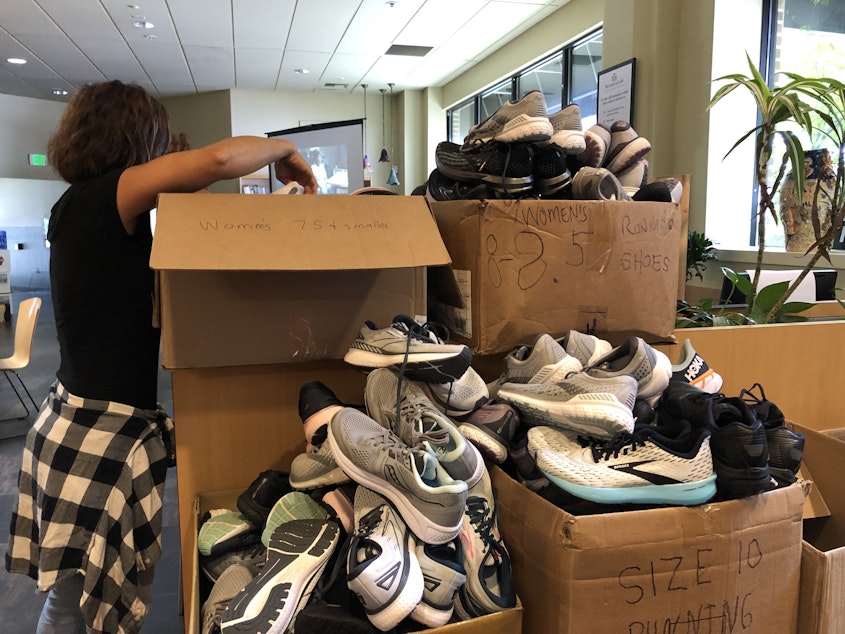'You belong here.' Recovery Café welcomes members as they are

The pandemic made people miss their favorite coffee hangout. But for regulars of Recovery Café, it was especially hard. This South Lake Union spot provides a sense of belonging for people dealing with addiction and trauma. Here’s how they helped members during the pandemic.
Before the pandemic, Recovery Café was buzzing with activity. Every afternoon, the tables were filled with members playing board games, or catching up, just like any coffee shop.
The people who come here are members and to become one, they must be drug or alcohol free for the past 24 hours, contribute to the café’s upkeep, and participate in a weekly "Recovery Circle."
“People know me and I know them,” said Mikey Starr, a member from the café’s early days. “And we’re all a family; it’s a clean family, but we’re still a family.”
For nearly two decades, Recovery Café has been a welcoming place for people experiencing homelessness, addiction, and trauma. Killian Noe helped start Recovery Café in 2004.
“Some of the people who walk through our doors have never been a member of anything,” said Noe. "And so we want to underscore that you belong here. And part of the belonging in a place is taking some ownership for the place.”
Sponsored
But like everything else, the café had to shut down at the start of the pandemic. Executive Director David Coffey says the lockdown was meant to protect the spread of COVID-19, but that also created a different risk for members.
“Isolation is a huge trigger for relapse,” said Coffey. “Isolation is not good for anybody… we are built to be connected with people.”
So Recovery Café bought cell phones and set up plans for members without them. Recovery circles that were normally held in person — were now online.
Coffey says it was vital to stay connected. He notes that nationwide there was a 30% increase in overdose deaths. In Washington state, 2021 is on pace to be another record-breaking year for overdose deaths. Preliminary data from the Washington State Department of Health has recorded more than 400 deaths in the first three months of 2021, compared to 378 deaths during the same period last year.
Members rely on the café not just for coffee and support, but for meals, too. So, working with another non-profit, they set up a to-go meal program.
Sponsored
Said Coffey, “We’ve served over 50,000 meals and we haven’t missed a day.”

Today, the café is open again. Both the people and activities are gradually coming back. Once a month, the café hosts a resource fair outside. There are tables set up with providers offering the coronavirus vaccine, social services, mental health services and free shoes and socks. Member Natalie Abdul Jawad says Recovery Café has been a refuge.
“I’m a transgender girl. Especially for me, I come from Saudi Arabia. I don’t have any family or friends here. This place to me is something that I can come into and feel safe.”
Sponsored
Inside the café, there are people watching TV and playing games. Longtime member Joan Patrie just came in from the resource fair. She says the pandemic made it easy to isolate.
“I came to the resource fair because I don’t need anything from the resource fair,” said Patrie. “It was an impetus for me to leave the apartment and go out and do something.”
Part of Recovery Café’s draw is everyone can come as they are, and share their struggles, their strengths, and their hopes. Co-founder Killian Noe says it’s about showing up for themselves — and for others.
“We live in a culture that has an epidemic of loneliness,” she notes. “But we wanted this to be a place where no one fall through the cracks. That everyone is deeply known by at least one small group of others so that when they walk in the door, they are seen, truly seen.”
Noe adds community can be messy. But at its core, we can travel further together than we could alone.
If you'd like to give feedback on this story, please email engage@kuow.org or you can click the Feedback button on the right hand side of this page. Reach out. We're listening.




